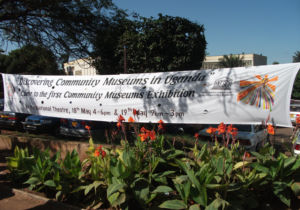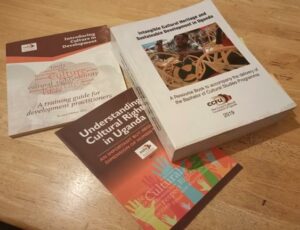Celebrating 20 years of implementing the 2003 Convention
on the Safeguarding of the Intangible Cultural Heritage
Congratulations to UNESCO and all actors in the culture sector for contributing to 20 years of safeguarding intangible cultural heritage for future generations! In 2006, when the Cross-Cultural Foundation of Uganda (CCFU) was founded, we strongly believed (and still do) in the relevance of culture to address development issues, and devised a “culture in development” approach to this end. This approach recognized the intrinsic value of cultural heritage and its resourcefulness in addressing contemporary development challenges.
At that time, cultural heritage was not perceived as an important aspect of development in Uganda: if anything, it was often considered backward, inferior and even “satanic” in some circles. Uganda’s national development vision, mission, strategies and programmes did not make any significant mention of cultural heritage and there were only a few national organisations and institutions whose mission was to promote cultural heritage. Thus, the Foundation did not have a strong frame of reference, but it sought ways to strengthen and validate our conviction and promotion of cultural heritage both at home and abroad.
When Uganda ratified the 2003 Convention on the Safeguarding of the Intangible Cultural Heritage in 2009, we were not sure what this meant for a fairly young heritage-focused organisation. We were however, pleasantly surprised to find that the Convention recognized and gave prominence to our target groups – communities, groups, traditional practitioners, and other individuals. This was a great source of inspiration as well as a valuable point of reference for the Foundation’s mission. This resulted in our application for accreditation to the Convention. As an accredited NGO, CCFU participated in the Consultative Body (and later the Evaluation Body), which proved to be perfect learning spaces to put into practice the spirit and principles of the Convention. This experience enhanced the Foundation’s respect for cultural diversity, knowledge of ICH and the manifestation of human and cultural rights in ICH safeguarding. It also influenced our programmes on heritage education, conservation, gender and promotion of the cultural rights of indigenous minorities.
 Over the years the Foundation has benefited from financial assistance from the 2003 Convention. In 2010, the first assistance the Foundation received went towards promoting little-known community museums whose existence and contribution to conservation of cultural heritage was not recognized. With support from the UNESCO Regional Office in Nairobi, these self-driven initiatives operated by individuals, families and clans in Uganda experienced heightened visibility. This resulted in the formation of the Uganda Community Museums Association and the inclusion of community museums in the updated Museums and Monuments Policy.
Over the years the Foundation has benefited from financial assistance from the 2003 Convention. In 2010, the first assistance the Foundation received went towards promoting little-known community museums whose existence and contribution to conservation of cultural heritage was not recognized. With support from the UNESCO Regional Office in Nairobi, these self-driven initiatives operated by individuals, families and clans in Uganda experienced heightened visibility. This resulted in the formation of the Uganda Community Museums Association and the inclusion of community museums in the updated Museums and Monuments Policy.
 As a beneficiary of the Intangible Cultural Heritage Fund, CCFU, inpartnership with four universities, the Uganda National Commission for UNESCO, the Department of Culture and Family Affairs (Ministry of Gender, Labour and Social Development), the Ministry of Education and Sports, and the National Council for Higher Education, developed a (first ever) fully-fledged Bachelor of Arts Degree course on ‘Cultural Heritage and Development’. Today, the youth in Uganda have access to cultural heritage studies and can potentially form a critical mass of heritage professionals in the country. Further, guided by the Department of Culture and Family Affairs, 6 communities have participated in processes that have led to the inscription of their ICH. With increased visibility of ICH, negative attitudes towards cultural heritage are slowly beginning to change.
As a beneficiary of the Intangible Cultural Heritage Fund, CCFU, inpartnership with four universities, the Uganda National Commission for UNESCO, the Department of Culture and Family Affairs (Ministry of Gender, Labour and Social Development), the Ministry of Education and Sports, and the National Council for Higher Education, developed a (first ever) fully-fledged Bachelor of Arts Degree course on ‘Cultural Heritage and Development’. Today, the youth in Uganda have access to cultural heritage studies and can potentially form a critical mass of heritage professionals in the country. Further, guided by the Department of Culture and Family Affairs, 6 communities have participated in processes that have led to the inscription of their ICH. With increased visibility of ICH, negative attitudes towards cultural heritage are slowly beginning to change.
As a trained ICH facilitator and a member of the Global Network of Facilitators, I have had the opportunities to train and interact with participants and communities in several countries, and I have appreciated the vital role played by the 2003 Convention in enhancing communities’ sense of dignity as their ICH is safeguarded and recognized at homeand abroad. Discovering other cultures that are similar or have similar meaning, values and principles was often a reassuring and pleasant experience for participants and communities alike.
Implementing the 2003 Convention has not been without challenges. Communities, groups and individuals are at the heart of the 2003 Convention, which requires application of ethical principles when working with them to inventory, safeguard and inscribe their elements. During these processes, communities, groups and individuals give their consent and provide information freely, trusting that their knowledge and skills will be safeguarded. They however do not have much control over the use of their heritage. While there is an ethical principle on community benefit, there is no mechanism or guidance on how this can be ensured. Thus, protecting the rights of communities and ensuring that they benefit from inscription as well as the use of knowledge generated under the umbrella of the Convention should be addressed in the coming years.
While inscription is very much sought after by communities, its effects need to be managed. Often, when ICH elements are inscribed, they attract both national and international attention. Understanding the impact of inscription and providing post-inscription advice to communities to manage the consequences of increased visibility would be useful. This could involve how to guard against prioritizing tourism demands over the original purpose of the ICH, and how to continue to respect the traditional bearers and create new spaces for their benefit and visibility without compromising their roles in enacting ICH elements. In cases where ICH elements include commercial activities, communities could be advised to avoid the danger of over-commercialization. Being equipped to manage relations with private sector actors would support communities to protect the integrity of their ICH elements alongside the economic benefits.
Many communities have expressed a desire have their ICH elements inscribed by UNESCO but due to the sheer numbers of countries, and the numbers of elements in all State Parties, as well as because of the administrative processes, only a few can be inscribed each year. UNESCO could encourage State Parties not only to inventory ICH elements, but also to device effective mechanisms for national level inscription. This would not only reduce on the technical process of evaluation at international level, but also provide an opportunity for many more elements to be recognized and safeguarded at national level.
The safeguarding of ICH elements provides opportunities to deliberate on sensitive topics, such as gender relations. In the enactment and safeguarding of ICH elements, both women and men play important roles that may be exclusive to one gender or mutually reinforcing. Exploring gender relations and dynamics can be quite sensitive and difficult to address, especially in contexts where these are strongly informed by religious principles. Although UNESCO has made efforts to illustrate the link between ICH and Gender in recent years, the role and visibility of women in ICH safeguarding is not sufficiently highlighted. Through the Convention, women-led ICH elements can be given more prominence as a resource to understand power relations, to contextualize perceived gender disparities, to enhance gender relations and contribute to peaceful co-existence.
As an accredited NGO, CCFU participated in the ICH NGO Forum and found it a valuable space to interact with like-minded NGOs and share experiences on implementing the 2003 Convention. In the next 10 years, the Forum could encourage the regional groupings to share approaches that could be replicable within and outside their regions. More visibility of the contribution of NGOs to the implementation of the 2003 Convention could inspire other heritage focused NGOs to implement the objectives of the Convention. Keep Heritage Alive!
On the whole, it has been a privilege to be part of the first 20 years of implementation of the 2003 Convention on the Safeguarding of the Intangible Cultural Heritage, and it is my hope that many more communities and NGOs will embrace the spirit and principles of the Convention to build a legacy of care and safeguarding of ICH for humanity.
Message from Emily Drani
Co-Founder and former Executive Director of the Cross-Cultural Foundation of Uganda (2006 – 2019)
Participated in the 2003 Convention Consultative Body and Evaluation Body and a member of the Global Network of ICH Facilitators and recipient of international assistance
Download PDF: Emily Drani – CCFU NGO – Uganda.pdf

